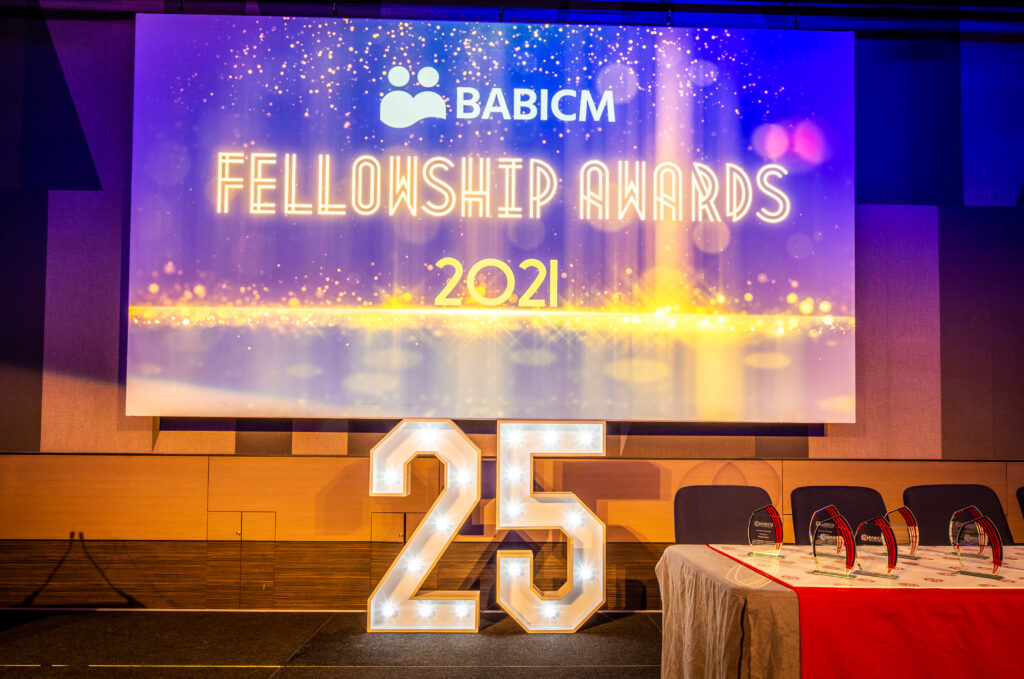
Celebrating 25 years
BABICM celebrated 25 years at its Annual two-day Conference ‘Dual Diagnoses: Another Brick in the Wall, Building Competence in Complex Case Management’, held last month at the Vox Conference Centre in Birmingham. Welcoming 340 delegates Vicki Gilman, BABICM Chair said: “I’m absolutely delighted to be able to welcome you all to this conference – it’s been so long since we were able to meet face-to-face”.
Commenting on BABICM’s 25th Anniversary, Vicki said: “As the representative body for brain injury case managers, we’re so proud of the significant role that BABICM has played over the years improving and enabling progress for those living with brain injury and complex conditions. My thanks to all the members and past Chairs for their support and help in steering the organisation. BABICM will continue to lead the way in research and evidence-based practice, influence and shape national policy and maintain the highest professional and ethical standards”.
Vicki thanked the conference sponsors including Irwin Mitchell Solicitors, The Royal Buckinghamshire Hospital, AKA Case Management, and the many exhibitors.
Sarah Griggs, Partner at Irwin Mitchell Solicitors chaired Day 1 and said: “Your amazing skills as case managers have had a significant impact on my clients and my team. It’s a vital working relationship during the litigation process”. Day 2 was chaired by Merrilee Briggs Director of Nursing, Royal Buckinghamshire Hospital. She said: “From a providers perspective I clearly see the difference that a good case managers can make to the patient journey”.
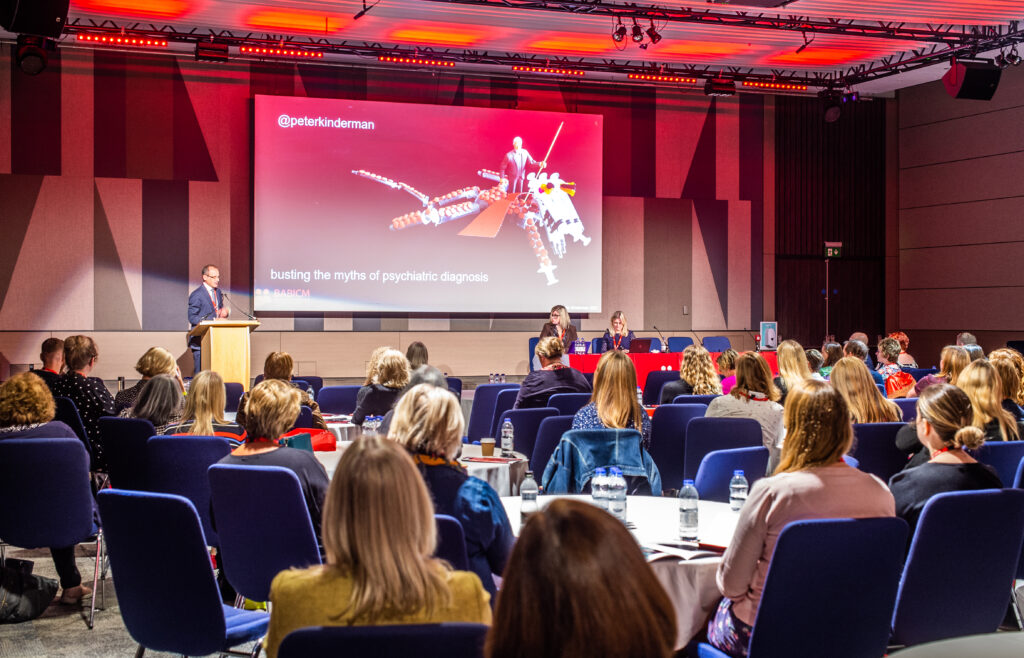
A successful BABICM conference – ‘live’ in Birmingham
Honorary Fellowships announced
Honorary Fellowships were awarded at the conference to Neil Brooks, Cathy Johnson, Jo Clark-Wilson, Jackie Parker, Jackie Dean, Carol Collins, Angela Kerr, Mark Holloway, Caroline Ferber, and Pamela Bunting.

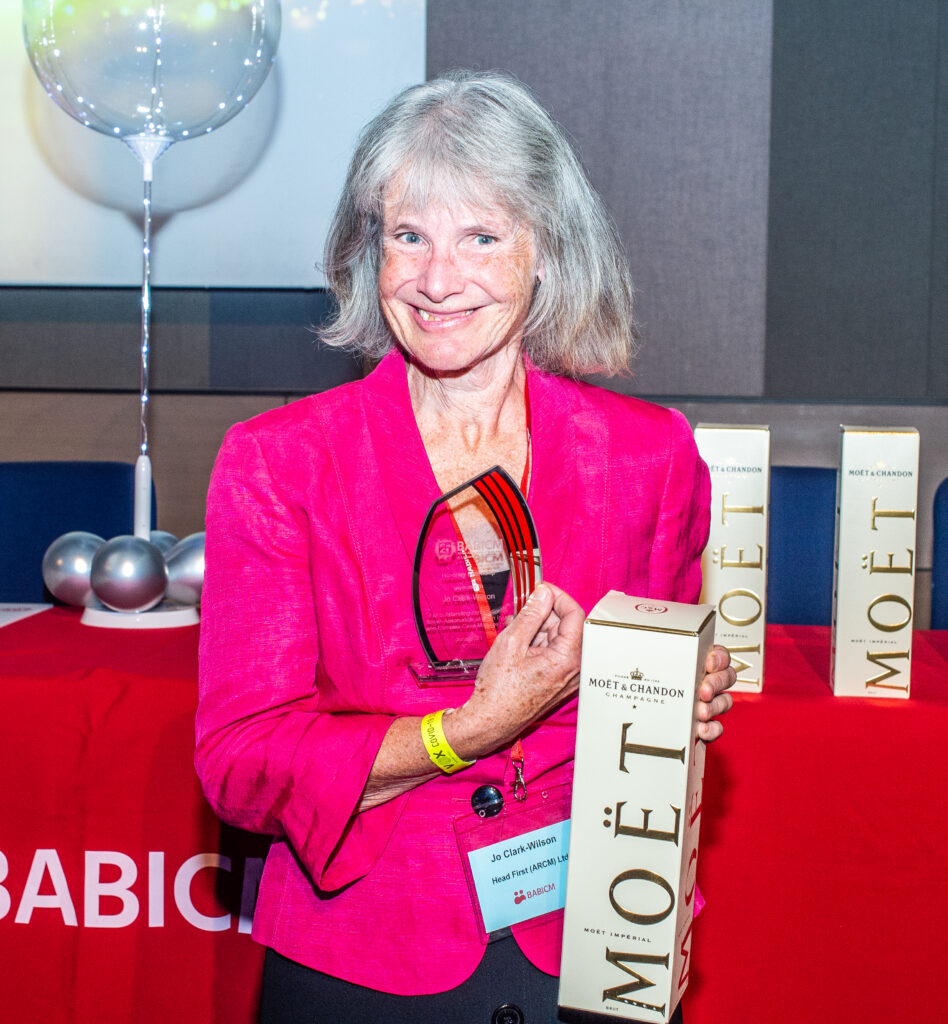
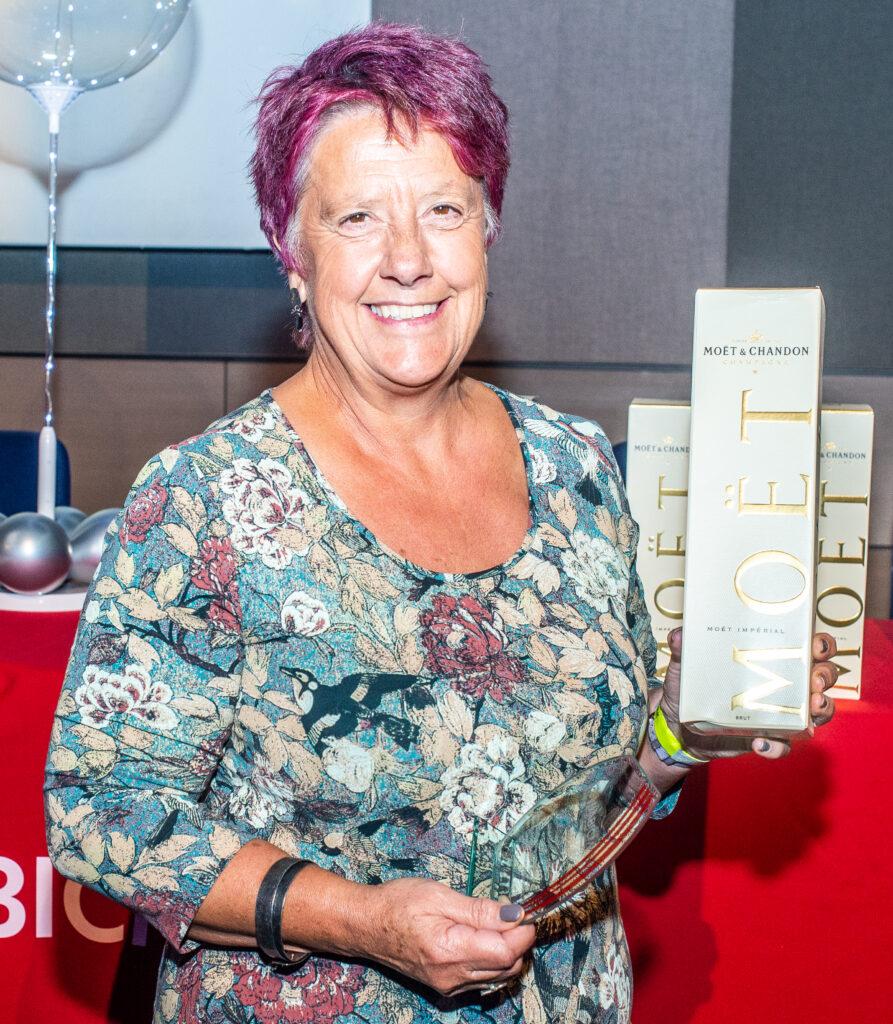
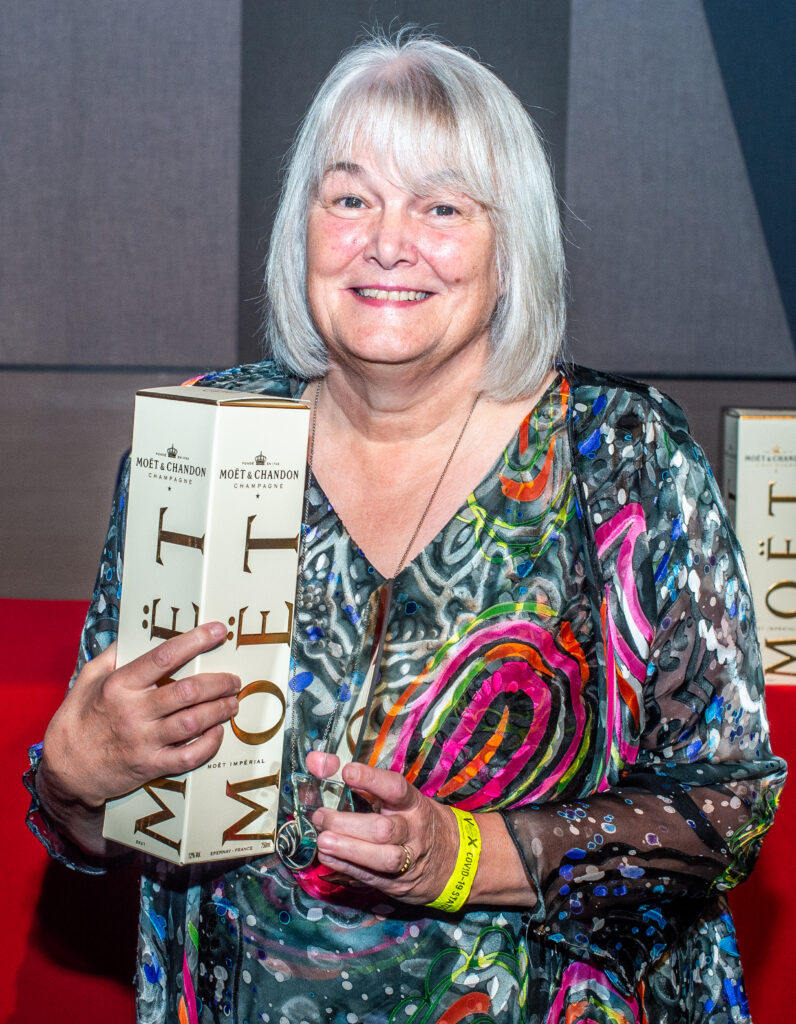
(Left to right) Cathy Johnson, Jo Clark-Wilson, Jackie Parker & Jackie Dean.
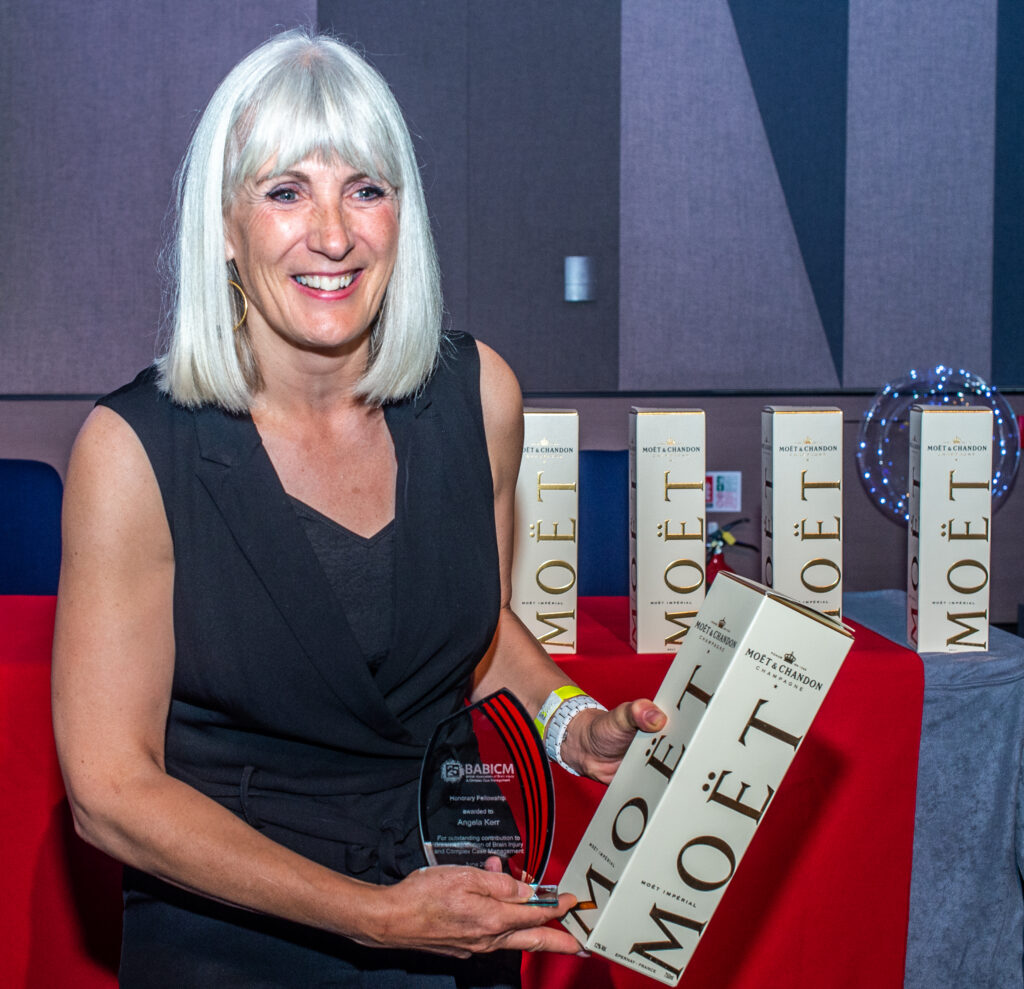
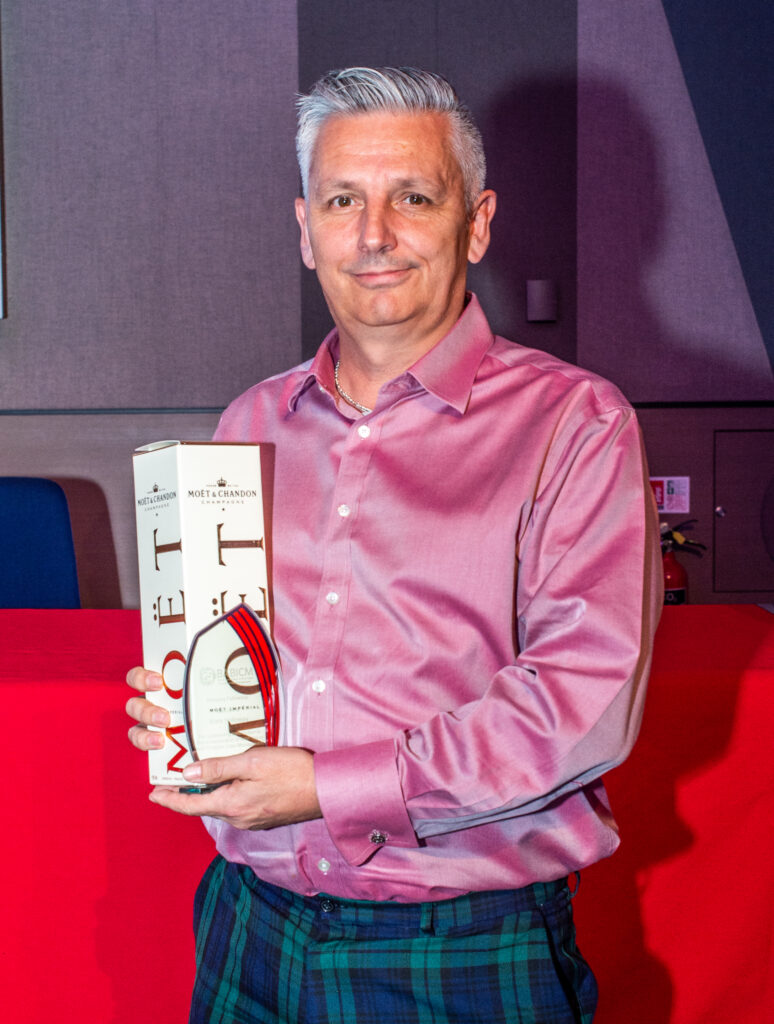
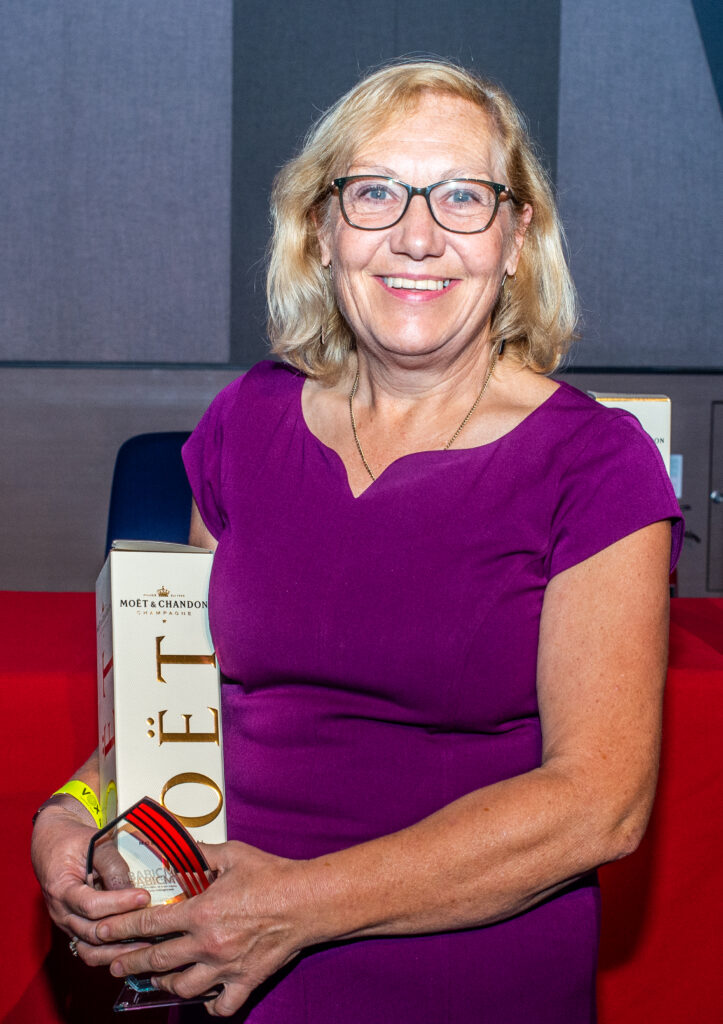
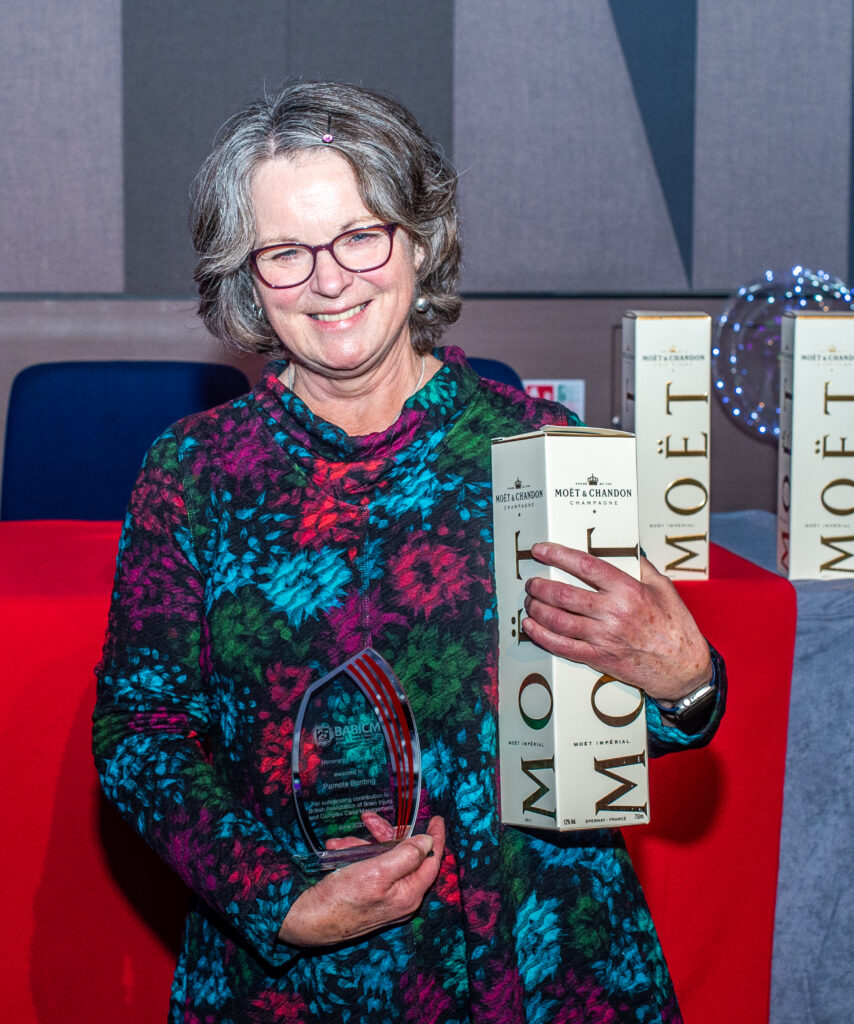
(Left to right) Angela Kerr, Mark Holloway, Caroline Ferber & Pam Bunting
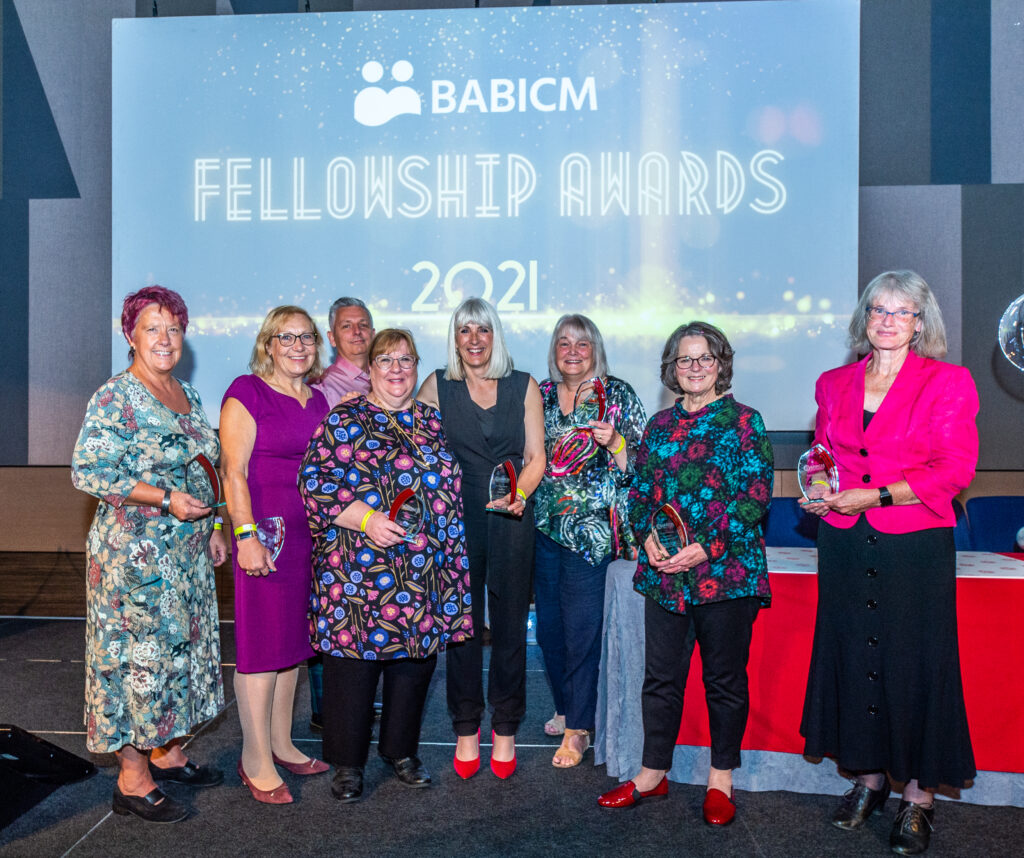
The new BABICM Honorary Fellows
‘Labels are for products not people’ – diagnosing mental health problems
The Freda Newcombe Memorial Lecture, acknowledging the contribution of Dr Freda Newcombe to case management development in the UK, was delivered by Professor Peter Kinderman, Professor of Clinical Psychology at the University of Liverpool. In a thought-provoking presentation, Peter challenged the current practice of giving people with mental health issues a diagnostic label and discussed alternative ways of looking at these problems.
Mental health and wellbeing depend on the society in which we live, on the things happen to us, and on how we learn to make sense of and respond to those events. Peter argued that unhelpful diagnostic labels could be reframed to recognise that distress is an understandable human response to life’s challenges. He said: “The diagnosis often just ignores the problem and defers it. Don’t ask what’s wrong with me – ask me what has happened to me. Labels are for products not people”.
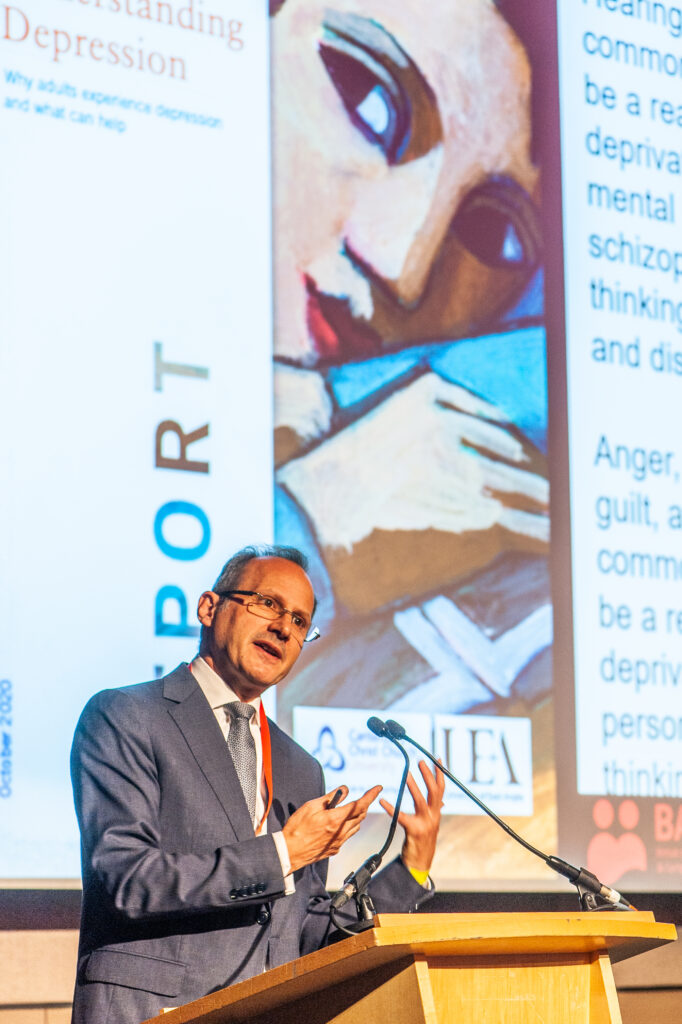
Professor Peter Kinderman challenged the current practice of
diagnostic labels for mental health conditions.
Brain injury and mental health – the challenges for case managers
Brain injury and mental health are often managed as two separate diagnoses, or sometimes confused as being the same thing. The brain injury can lead to mental health issues developing, and an untreated mental illness can be a cause of brain injury if the person is drunk or under the influence of drugs at the time of the injury. Addressing this ‘perfect storm’ as these two issues collide was the focus of several talks at the conference.
Dr Michael Dilley, Consultant Neuropsychiatrist at Brain and Mind Ltd gave a comprehensive ‘tour’ through mental health management and highlighted the resources that would be useful to case managers. Accessing mental health services is challenging; case managers need to raise their clients’ mental health problems as soon as possible and be signposted to the right places. As only one of 34 neuropsychiatrists in UK, Mike said: “A patient should be able to access mainstream psychiatry services even though they have a brain injury and we’re working to change this”.
Mike recommended that if there is an immediate emergency call 999. If crisis management or admission consideration is required then call the Crisis Resolution/Home Treatment Team. A Single Point of Access can be found online: www.nhs.uk/service-search/mental-health/find-an-urgent-mental-health-helpline. For non-crisis management the general practitioner can be contacted first, and many have access to primary care liaison services. Mike advised case managers: ‘Do a risk assessment, make the relevant call and stand firm”.
Dr Czarina Kirk, Consultant Neuropsychiatrist, at Guild Lodge, Lancashire and South Cumbria NHS Foundation Trust, the only NHS service if its kind, discussed psychosis and how it is managed at the Secure Mental Health Business Unit (SMHBU). SMHBU is a comprehensive network of 164 medium secure, low secure and step-down beds and specialist forensic community services providing assessment and formulation; care and treatment interventions; rehabilitation and recovery; and risk assessment and risk management for individuals with complex mental health care needs. Czarina said: “It’s important to get the mind and brain in a place so it is ready to receive the rehabilitation”.
Dr Darren Carr, Clinical Director and Associate Medical Director for North Staffordshire Combined Healthcare NHS Trust discussed two types of substance abuse in brain injury, alcohol, and cannabis. Substance misuse in brain injury is common but often overlooked, and it is difficult to access services which are ‘patchy at best’. Darren said: “Good optimal treatment for substance misuse is a multidisciplinary, multiservice endeavour otherwise you won’t get the outcomes you need”.
Publishing your work to influence practice
BABICM has played a significant role over the last 25 years in improving and enabling progress for those living with brain injury and complex conditions. It has become an influential and powerful organisation and research is key to continuing this journey. This was reiterated by Jo Clark-Wilson and Dr Mark Holloway from Head First and Jackie Dean from N-ABLE Services, all members of the BABICM Research Group.
Jo and Jackie looked back at BABICM’s journey. Jackie appealed to delegates: “Practice evidence leads to evidence-based practice. Your work is important. We need your input and BABICM needs you to publish your work”. Mark supported this:
“Our roles as case managers impact on other people’s lives, and it’s crucial to know and understand that what we’re doing is evidence-based. If we don’t evidence our work why would an insurer pay for it?”.
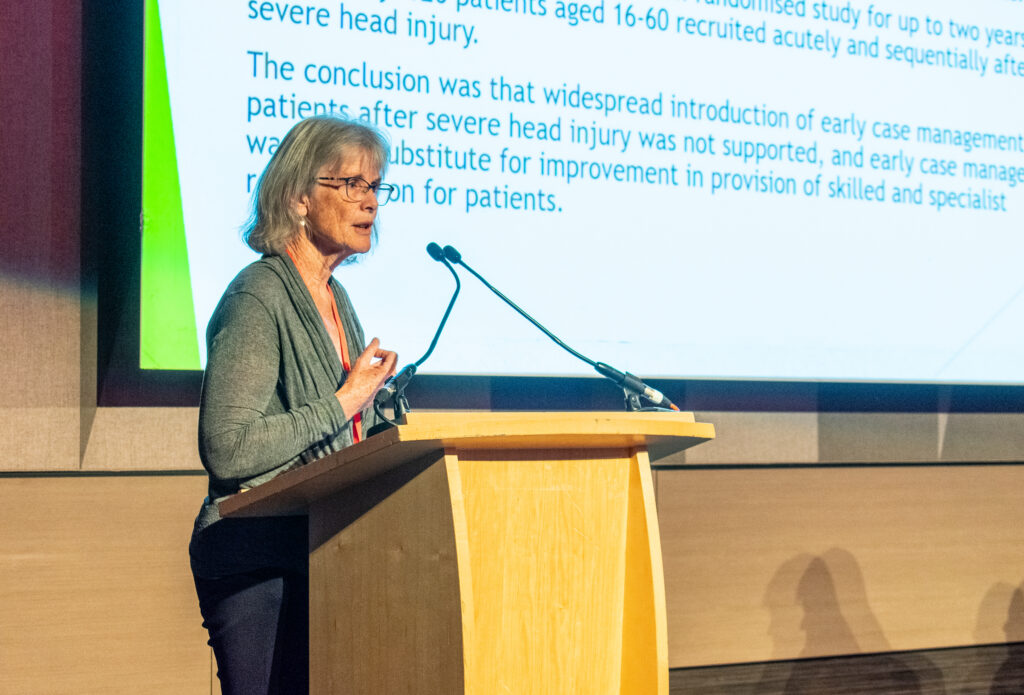
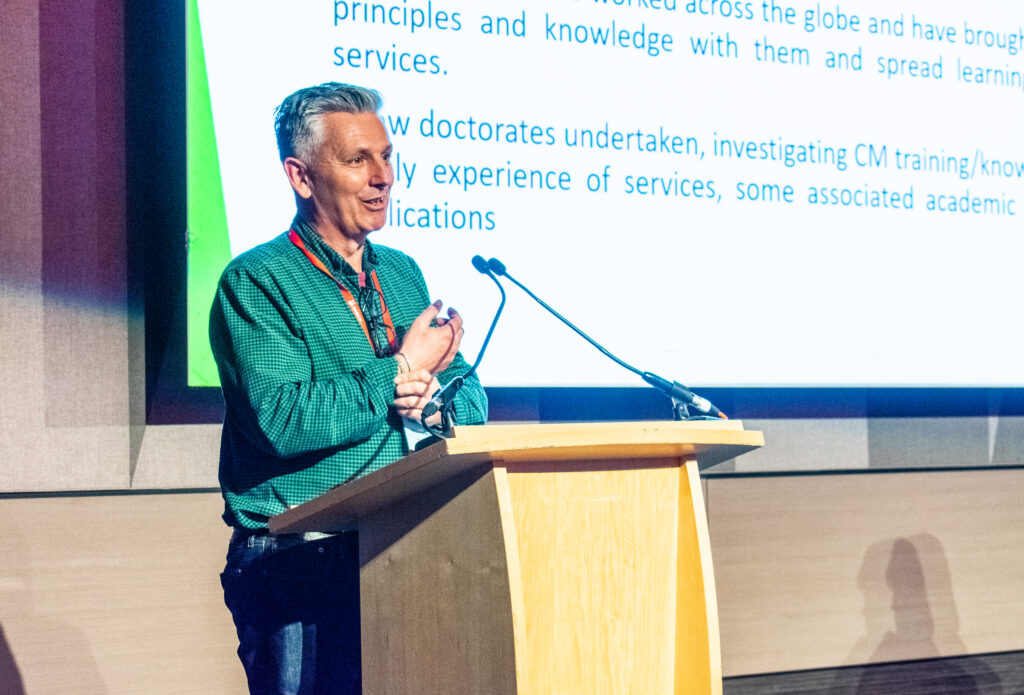
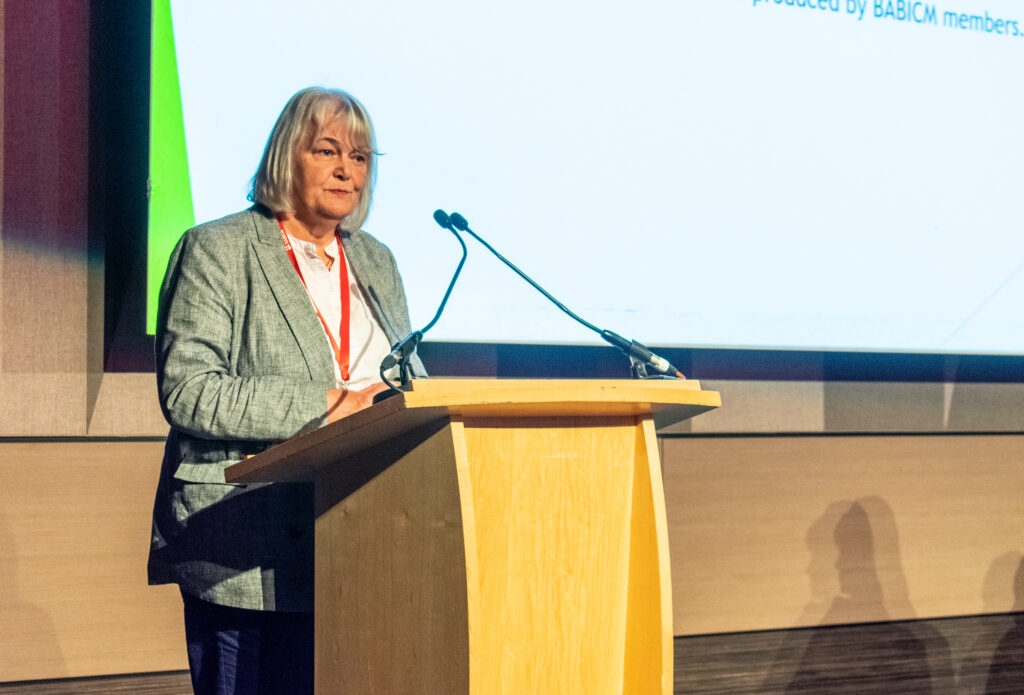
(Left to right) Jo Clark Wilson, Dr Mark Holloway and Jackie Dean encouraged BABICM members to publish their work and raise the profile of case management.
Working collaboratively is key to successful and timely settlements
Huw Ponting, Head of the Personal injury Team at Enable Law, Mark Bailey, Head of Complex Injury at DAC Beechcroft Claims Limited and Anita Pascoe, Case Manager at Westcounty Case Management jointly looked at the vital role of case managers in achieving timely settlements and concluded that ‘collaboration is key’ with the case manager crucial to a successful outcome.
Ken Young, Partner at Keoghs reviewed the reasons why cases go wrong and provided advice on how to make the process smoother and better for all concerned. Ken said: “Working together collaboratively makes the entire process work easier and is much less stressful”.
Are you part of a psychologically safe and healthy team?
Psychological safety has been an important discussion area in the field of psychology, behavioural management, leadership, teams, and healthcare. Several studies have shown that psychological safety plays a key role in workplace effectiveness. It has a significant role in facilitating ideas and activities and enables teams and organisations to learn and perform. “You must feel safe to take risks in a team; you must feel able to challenge in an environment where you won’t be criticised or humiliated” said Dr Graeme Flaherty-Jones, Consultant Clinical Psychologist and Clinical Director at Clarity Psychology. He continued: “the best performing teams have trust and cooperation; these, key factors in health and rehabilitation”.
Building psychological safety is the ‘backbone’ for a team. Case managers have models, system, and processes to help them feel ‘safe’ but sometimes deviating from the common pathway is required if that is what is right for the client. As Graeme concluded: “Let those that are valuable to us always feel valued by us”.
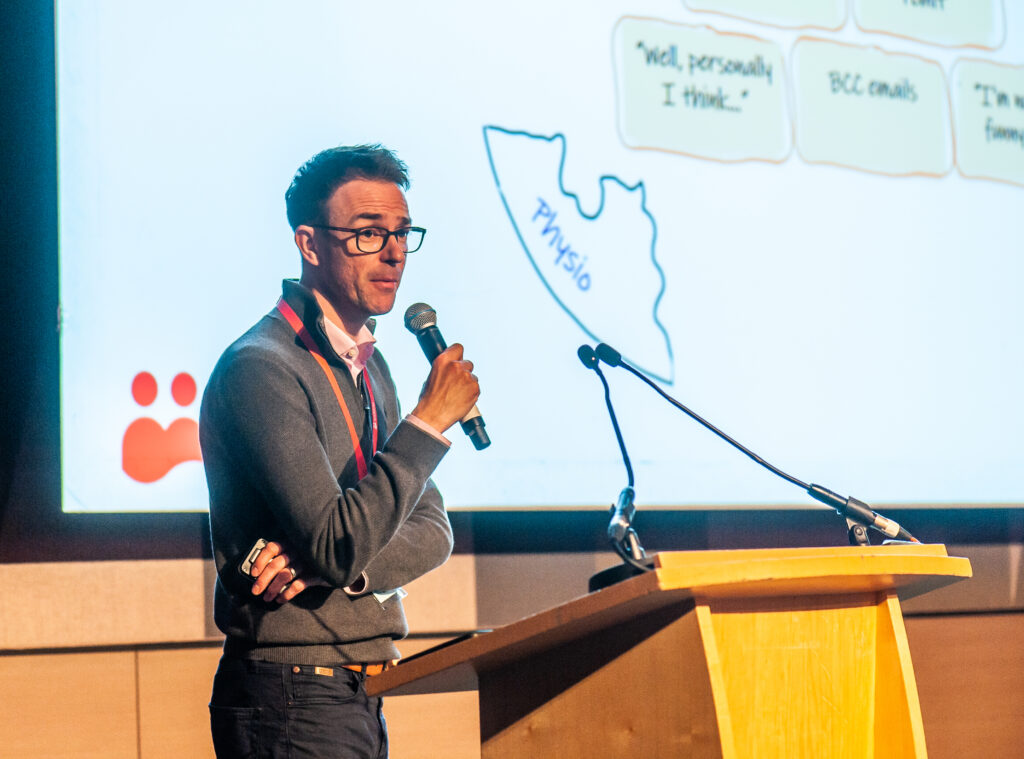
Dr Graeme Flaherty-Jones stressed the importance of team members being
‘psychologically safe’ to enhance workplace effectiveness
Health and welfare decisions for vulnerable adults
Karen Jackson, an associate in the Mental Capacity Health and Welfare Team at Enable Law gave a comprehensive tour through the complexities of the Mental Capacity Act, Care Act, and the Deprivation of Liberty Safeguards. The need for information is crucial for all parties involved to make informed decisions. Karen said: “Keeping people safe without intruding on their human rights is difficult and all these laws endeavour to do this”.
Mild traumatic brain injury and post-traumatic stress disorder – distinguishing between the two conditions
Major James Mitchell, a British Army Medical Officer currently completing dual specialist training in Neurology and Rehabilitation, introduced the Defence and National Rehabilitation Centre (DNRC) programme at Stanford Hall near Loughborough, and discussed Mild Traumatic Brain Injury (mTBI) and Post-Traumatic Stress Disorder (PTSD).
The DNRC Programme is delivering a 21st century successor to the Ministry of Defences’ former Headley Court facility in Surrey. It opened in 2018 and is now treating members of the armed forces. A National Rehabilitation Centre (NRC) will provide clinical rehabilitation for NHS patients as well as providing a national hub for innovation, innovative Research and Development, training and education. The NRC is on the same site as the Defence establishment – but 400 metres away – to allow patients in both centres to benefit from shared expertise, knowledge, and facilities.
James discussed the symptoms of mTBI; the headaches, cognitive problems, vestibular problems, and mental health issues, and said that its classification is contentious, and diagnosis is an issue. He described PTSD and said that its diagnosis is also contentious and will change over the next few years with new technology available. What starts out as mTBI can later be diagnosed as PTSD; the conditions are related and overlap. If a patient has more of the physical problems it gets referred to as mTBI; if there are more of the psychiatric symptoms it is called PTSD.
Key tips when applying for NHS funding
The issue of clients who run out of money and Clinical Commissioning Groups (CCGs) no longer funding their care was discussed by Maggie Sargent, Case Manager at Community Care Management Services Ltd and Dr Audrey Daisley, Consultant Clinical Neuropsychologist at Oxford University Hospitals NHS Trust.
NHS Continuing Healthcare (CHC) funding is available to adults living in England who have particularly intense, complex, or unpredictable care needs. Case managers have a key role to play in helping to obtain CHC and both speakers advised: “Evidence is essential; don’t apply for funding unless you have the evidence”. Preparation is crucial with timely, professionally written examples of records needed to support the CHC application.
Enlisting the help of a person experienced in CHC applications is key to ensure the wording is correct and extensive detail is provided on domains such as the nature, complexity, intensity, and the difficulties experienced by the client. Support workers and the family may have to be guided and encouraged to gather the right information.
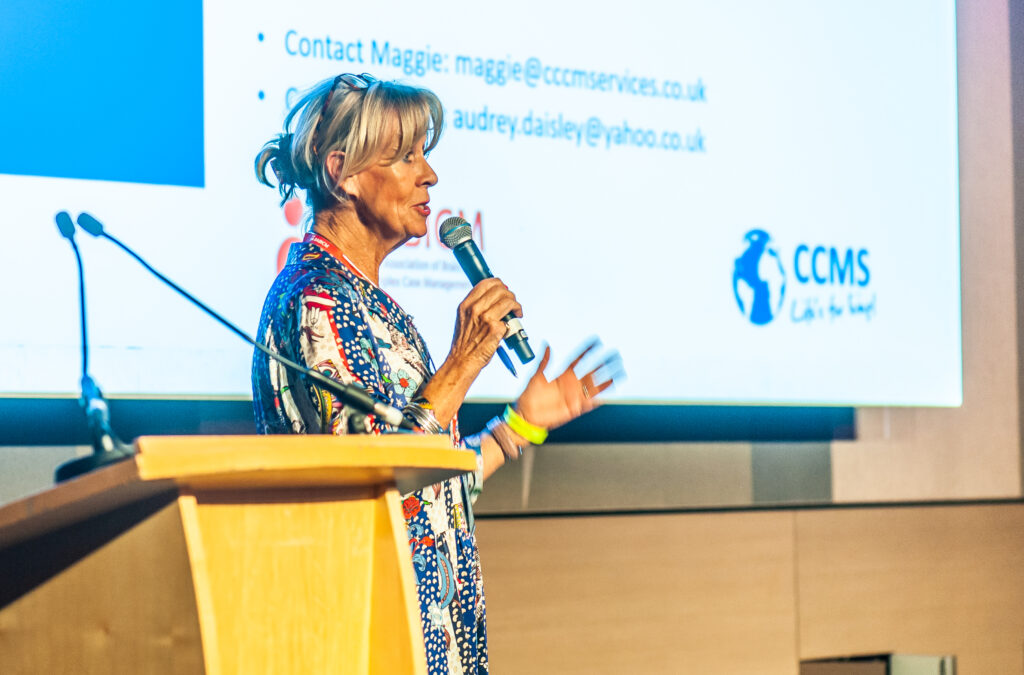
Maggie Sargent stressed the importance of supporting clients and their families
through the process as it can be a distressing time.
BABICM’s 25th Anniversary Conference – a successful celebration
BABICM members celebrated the Anniversary in style at the conference venue with a drinks reception followed by a sit-down dinner. The room looked amazing and even the dessert included the 25th Anniversary logo! Members were entertained by Ben Shelvin, a stand-up comedian and supporter of brain injury awareness. Ben had a serious head injury in a motorcycle accident in Croatia 12 years ago but subsequently made a remarkable recovery. Many of his jokes focussed on brain injury, making light of situations he finds himself in; there was much laughter, and a fun evening was had by all.
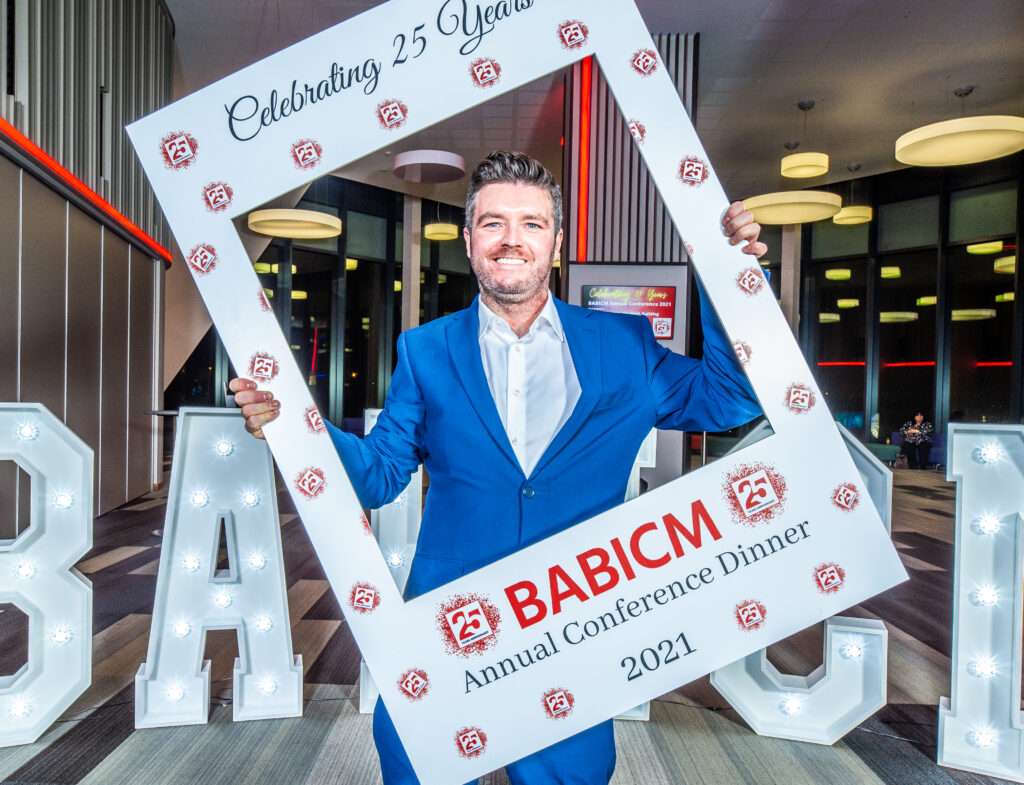
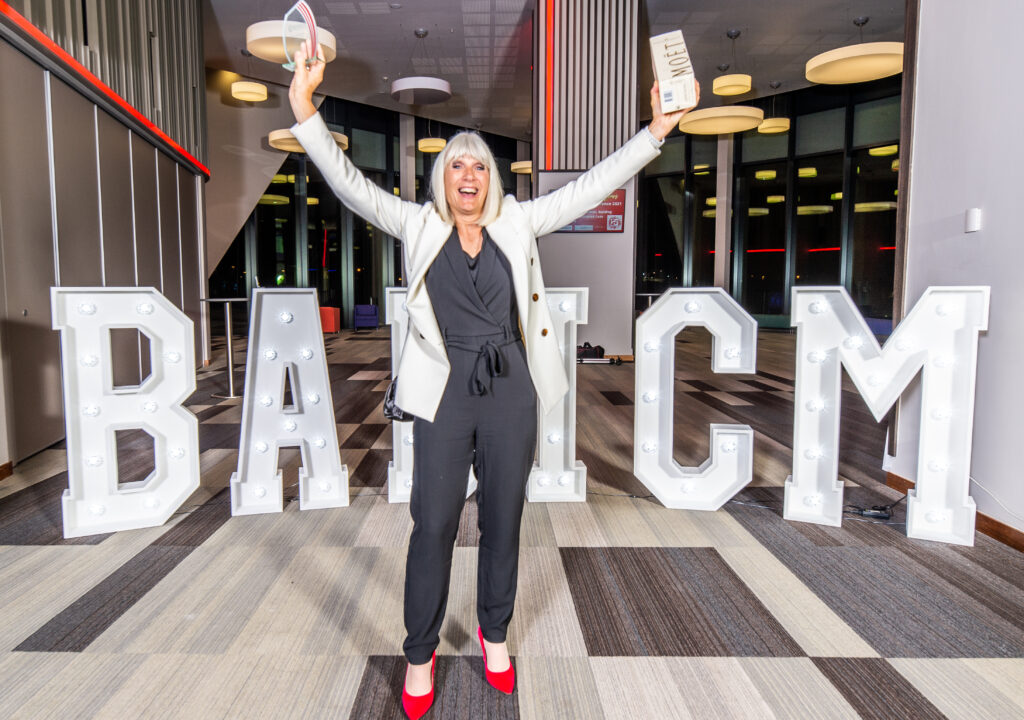
(Left to right) Comedian Ben Shevlin brought the house down and Angela Kerr celebrates her well earned Fellowship award.

